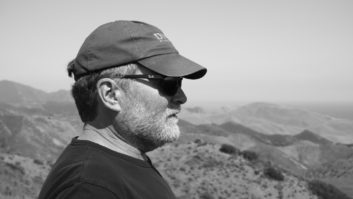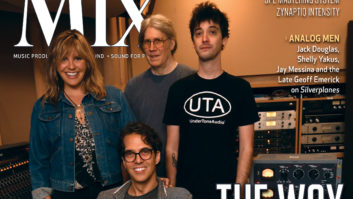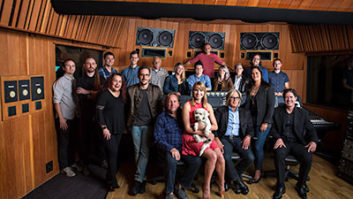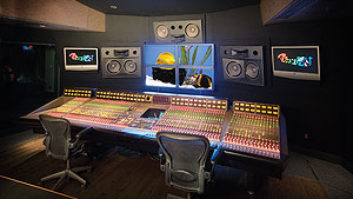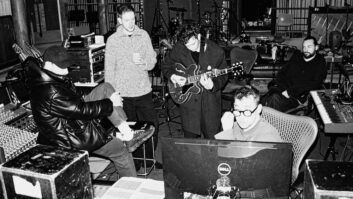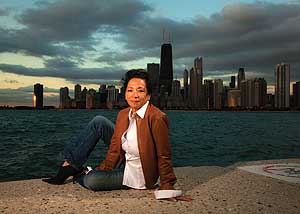
Photo: Charles Cherney
Rose Mann Cherney is the quintessential studio operator. She’s spent the bulk of her 30-plus-year studio career at Record Plant in Los Angeles, and truth be told, the two are so intertwined it’s hard to imagine one without the other. And it’s not just a career; it’s a lifestyle. Record Plant was the first studio to implement the philosophy that recording clients should be treated like guests in a fine hotel. Originally, studios had been seen as nothing but utilitarian song factories—a place to get the job done where comfort and service were not priorities. At Record Plant, all that changed, and Mann Cherney was key to making the new regime work. Her clients are welcome guests, and she goes to great lengths to ensure that the rest of the studio staff treats them that way. She understands the importance of comfort, vibe and, most of all, good service. She also understands the value of privacy. A witty conversationalist, she’s adept with entertaining stories. But when it comes to things that matter, her lips are sealed.
Now a partner in the business and company president, she’s a confidante of rock stars, a champion of assistant engineers, a savvy judge of character, a loyal friend, a fervent foodie and great cook. But even though she’s lived an L.A. lifestyle for those same 30-plus years, Mann Cherney, who was born in Chicago, is still deeply attached to her roots. Retaining the traits of a Chi-town native, she can be as bottom line as they come, she doesn’t miss a trick and she tells it like it is. Married for 20 years to Grammy-winning, multi-Platinum producer/engineer Ed Cherney, she’s assembled a large universe of friends and fans. She generously shares her business knowledge, and has influenced studio managers and owners everywhere. She also shared some of that knowledge with me one recent evening as we relaxed in her patio garden overlooking the Venice canals.
How did you end up in this business?
I fell into booking by accident, back in Chicago. I was working on a modeling career and supporting myself as a bill collector. [Laughs] I had sort of an ethnic look—nobody wanted a model that looked like me! I was also hanging out with a band called Big Thing—which became Chicago—and I met a lot of people in the industry. Bill Traut, of Dunwich Productions, asked me to come and work for him. He thought I’d be good at booking. And I was!
That’s an understatement.
I went on to work with Curtis Mayfield, and eventually had my own little booking agency with like 21 bands, which is how I met Al Kooper. When I decided to move to L.A. and was looking for a job, I ran into Al at the Rainbow. He told me about a studio that needed a front desk girl/booker, and he arranged an interview for me with Chris Stone [one of the owners of Record Plant].
While I was sitting waiting to see Chris, I could feel the electricity and mystery in the air. I felt it from when I was buzzed in and I walked down the hall where Stevie Wonder was playing air hockey with Glenn Frey. Amazing. [Laughs] There’s more to tell that I saw that day, but that’s for my book.
The interview was pretty crazy. Chris was a very reserved businessman who turned out to be hugely important in my life, and remains so. The next interview was with Gary Kellgren [the other RP owner], who was the complete opposite. He was wearing a top hat, a long green velvet coat, and had a cooler filled with champagne. Very eccentric. [Laughs] But Al had warned me about him.
I told them I could only promise a year. I wanted to work in music publishing and I thought the studio was a good place to learn. But the week I started, Stevie Wonder was recording Songs in the Key of Life and The Eagles were working on Hotel California. Within six months I knew I had found my niche. I loved, and still love, being in the studio surrounded by music and creativity. Musicians, managers, promo guys, stylists, designers—it was definitely the scene and you could learn a lot if you paid attention.
One day a producer asked me to make him a screwdriver, and I made it fancy, like he was in a fine restaurant. He loved it, and that’s when I got it: Treat the clients like they are in your home.
And that’s part of Record Plant’s philosophy.
That and “Everybody is a star; no one goes home unhappy. Whatever it takes to get the job done.” Doing that has given Record Plant a reputation that has lasted. The look on a young band’s faces or an intern’s face when they first walk into one of the most well-known studios in the world—just to feel it is exhilarating. It gets me high—as does a full studio with artists jumping from room to room creating.

Engineer Ed Cherney, Rose Mann Cherney and Record Plant owner Rick Stevens
Back to 1976.
I have to admit, when I started I didn’t know anything. One day they sent me to get a dozen nanowebers. And everybody went along with it. I called one of the rental companies, and said, “I’m Rose Mann from Record Plant. I just started here and I’ve been asked to order a dozen nanowebers.” And the guy said, “You know what, let me check.” He must have put the phone down, and gone, “Heh, heh,” before he came back and told me they were all out. But you know, I’m engineer-trained.
What do you mean?
Engineers taught me how to do my job. Like when someone’s mixing, you can’t just go in the room and change things. See, in those days there weren’t lockouts—or Total Recall either. It was hourly, with double shifts. Eight in the morning until whatever at night, then whatever until morning. And when you had tracking, it was a problem because nobody wanted to tear down. It was the engineers who knew what was going on and taught me what you could and couldn’t do. They also told me about client preferences and how to handle them.
I would take my booking book and sit with them and they would explain things to me. Gary Ladinsky, for example, taught me about microphones, about the difference between tube mics and what mics were good for snares, and how if you had to move mic stands you should mark where the stands had been so you could put them back properly—and to try not to move the drum kit! I also learned a lot from Gary Kellgren, who was a brilliant engineer. And, of course, I learned how to juggle bookings because when they said they’d be done at 12, a lot of times they weren’t.
Things are a lot different today. What’s still great about your job?
It’s challenging but we are still doing what we love—making music with will.i.am, writing camps, DJ Steve Angello (Swedish House Mafia), Lady Gaga, Ron Fair recording strings…
My business is 50-percent songwriter-based now. Instead of a rock band with all their techs, more often it’s one guy writing and working with five different artists. The creativity is there. It’s just different.
You have a huge responsibility to keep multiple studios booked and you have demanding clients to keep happy. How do you do it?
I can do it because I have a really great management team: Sayoko Rutledge, who is studio manager, and Jason Carson, VP, who’s been with me 10 years. We work hard, play hard, have fun and the client is always right!
But you’re also strict. There are things you just won’t do—or allow.
In the studio you have to have balls. Enough balls so that you don’t back down when someone tries to push you around. That was difficult for a woman in those days, and I think part of why I excelled. I didn’t take shit from anybody.
The first time I held tapes [as collateral until payment was received] was my first encounter with bodyguards. Chris was worried about me because I was so angry. The band’s manager is one of my good friends now, but that night I sat on those multitracks and dared those guys to touch me. All 120 pounds of me—in my layered ’80s hair! I was sitting on them thinking, “I hope they don’t print through!” That was my engineer training. They taught me about stacking tapes the right and wrong way.
I’ve heard you can be tough.
No one is ever going to tell me how to run my studios. Nobody can pay me enough money to disrespect the studio or my staff. I won’t let someone come in being disrespectful to my kids. They work hard. The studio business—any good business—doesn’t run on one person. It’s a unit. We run as one entity, and if one little part of us is off kilter, even a runner, it throws the whole thing off. I really, truly, believe that you are only as good as your people.
Good people aren’t easy to find.
You have to interview a lot of people. I’ll interview 25 before I find one runner. I’ve always been fussy and I’ve been doing this so long I can spot things. When a guy is walking through the hall, I can tell if he’s ready to leave the nest. Or I can tell if they’ve lost interest, just by the look in their eyes. I can spot it, and I’ll say, “What’s wrong? Let’s talk.” Some people are just not cut out for studio work. And if they’re not, I try to help the good ones find jobs.

New wave rocker Billy Idol (left) and producer Keith Forsey with Rose Mann Cherney
You’re big on training.
I have rules. I train staff by giving senior guys as much studio time as possible. The older kids train the younger kids. I also have studio etiquette classes. And no distractions allowed for the staff in the studios—they need to be present all the time. No hanging out on the Internet, no books, none of that. They have to be dressed a certain way—no flip flops; they have to be shaven. If they want to have lunch with the client, they can if they are invited, but, especially if they are new, I say to them: “If I were you, I’d be in the studio thinking about what my next step is instead of sitting there having lunch.” I want people who are going to work at keeping their craft up.
I also work with label people. I’ll invite new admin people over for lunch and show them how sessions work. And I’ll advise having their own hard drive for security and labeling. With things so songwriter-based and people working in different locations, it’s not uncommon that people lose track of where their files are. It’s important to control your hard drives during each session. If you don’t, 10 years from now you won’t have to worry about a greatest-hits record because you won’t be able to find anything.
If they take their hard drives home, the studio has no collateral.
There’s no collateral anymore. The last time I had to hold something, it was a huge deal and I just locked up the entire studio with all the gear. But now the only collateral you have is COD. Even with purchase orders you have to follow up. You always have to keep your eye on things and you have to do your follow-up with labels so you know how they do things. You have to pay attention. Paying attention to detail in the recording studio is the most important thing. I keep riders for everybody, even A&R people. Notes on what they like. If you’re not paying attention to detail, you might as well close your doors.
How about the ineffable skills—studio etiquette?
You have to be invisible. With an assistant, you want it to feel like he or she isn’t there until something is needed—then they are totally there. You can tell what kind of assistant someone’s going to be when they’re a runner. The mistakes they make when they’re running are the same ones they’ll make later. That’s why nobody gets into a studio for the first six months except to clean it.
A lot of these kids come out of school and their teachers haven’t taught them what the music business is really like. Many of the studios in town make interns work for free. I only intern a couple of people, but I pay them. After six months they can go, on their own time, and shadow sessions that the senior assistants do, then after that they assist the senior assistants. And the senior assistants can tell me what strengths the new people have. You have to do it that way. You can’t just throw somebody in a room because you’ve known them for a month.
You’ve been doing it so long, don’t you ever get bored?
Never. Some days I look around, and say, “What am I still doing here?” But I still get excited about it. Because the Record Plant is special. I lucked out to have worked for two extraordinary, powerful visionaries who had great senses of humor. Both Chris [Stone] and [current owner] Rick [Stevens] were corporate in their backgrounds, and they are both marketing guys. I learned a lot from them. Chris started me off and Rick fine-tuned gme and has continued to be a great mentor. I have an unorthodox way of working. A lot of it is gut instinct and flying by the seat of my pants, which took a bit of time for Rick to get used to. Eventually, I think I wore him down and he just let me do my thing. I have to give him a lot of credit. We still do our share of head butting, but in the end our styles complement each other.
Do you have a secret weapon you’ll disclose?
I know people who can do things for me. If you have a business like ours, you have to know how to find anything, from a sommelier to an au pair. I like to think there’s almost nothing they can ask me for that I can’t figure out how to get within minutes. We’re in a service business. It’s service with artists, producers, even the labels. People at labels really have it hard now. They have so many less people and so much more work to do. If you go out of your way for them, they’re going to want to work with you again.
The thing is, you have a team where people care. That doesn’t just happen. It has to start with you. You lead, you train and then get out of the way. I want my people to be better than I am. You have to be able to do that with your staff.
Maureen Droney is senior executive director of the Producers & Engineers wing of the Recording Academy.
